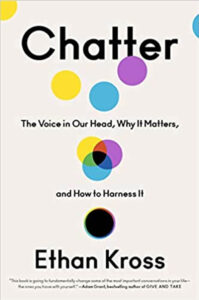 Review by Myra Salzer
Review by Myra Salzer
I am often plagued with a 2:00 AM monkey mind. It’s debilitating and sometimes won’t go away for the rest of the night. I lie there awake just waiting to get up. It’s not the greatest lead-in to my meditation practice, to say the least. My 2:00 AM monkey mind became more frequent after my mother’s death, since I’m responsible for settling her estate and dealing with nine beneficiaries and four brothers. When I heard a podcast featuring the author of Cleaning Up Your Mental Mess – 5 Simple, Scientifically Proven Steps to Reduce Anxiety, Stress, and Toxic Thinking, by Dr. Caroline Leaf, I thought, “Perfect!” A solution, finally! I started reading her book and realized that the five simple steps to eliminating monkey mind required 62 days of practice. Talk about the antithesis of immediate gratification!
Then, I found another book on the topic, Chatter – The Voice in Our Head, Why It Matters, and How to Harness It, by Ethan Kross. Fortunately, this book was more readable, more practical, and provided instant tools that could be applied to help reduce monkey mind. The tools are easily understood and implemented. For example, if you’re plagued with negative thoughts, you can imagine advising a friend. In other words, distance yourself from the emotion you’re feeling by being detached enough to pretend you are advising a friend on what to do under similar circumstances. Another tool is to merely change the pronoun when you describe the topic that is noodling you. Say you instead of I. For example, instead of ruminating about how, “I can’t deal with the incompetent bankers as I’m trying to settle my mother’s estate,” I repeat to myself, “it’s amazing how hard it is for you to deal with bureaucratic incompetence.” Amazingly, that simple change puts distance between the emotion and yourself, and, for me anyway, it allows me to get some sleep. 😉 Another tool the author recommends is to journal about monkey-mind thoughts. For me, personally, I did not find this tool as effective as several of the others.
Kross is a psychology professor at the University of Michigan in Ann Arbor. Much of his book is about the research behind developing tools to cope with intrusive thoughts. Nonetheless, it’s written in layman’s terms and is quite interesting. For those who want to learn the methods to stop or minimize “the chatter,” just skip to the last chapter, which summarizes all the tools. Chatter – The Voice in Our Head, Why It Matters, and How to Harness It is a practical, readable, implementable book that’s worth the time if you’re plagued with a frequent monkey mind.